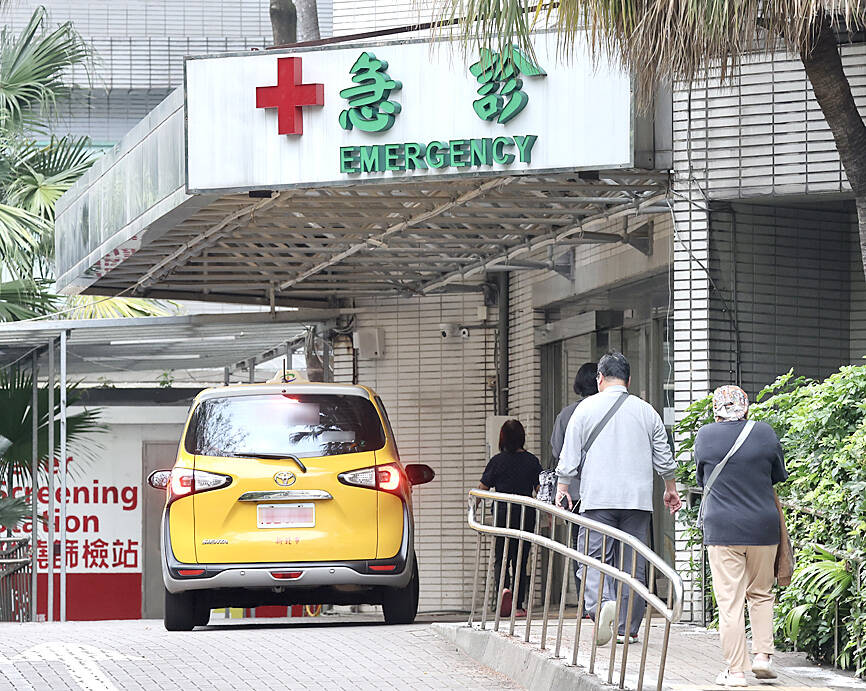The Ministry of Health and Welfare yesterday said it is mulling establishing new nurse-patient ratio standards and bonuses for nurses working three shifts in emergency rooms (ERs), following reports of overcrowded ERs.
After the Lunar New Year holiday, healthcare providers have been urging the government to help solve the problem of overcrowded ERs, with the Taiwan Society of Emergency Medicine last month calling the seriousness of the problem “unprecedented.”
After President William Lai (賴清德) and Premier Cho Jung-tai (卓榮泰) last week instructed the ministry to carry out improvement measures, Minister of Health and Welfare Chiu Tai-yuan (邱泰源) and department heads yesterday held an impromptu news conference.

Photo: CNA
According to the Establishment Standards for Medical Institutions (醫療機構設置標準) and hospital accreditation standards, there should be one nurse per bed in the emergency observation rooms, and at least one nurse per 12 ER patients, Department of Nursing and Healthcare Director-General Tsai Shu-feng (蔡淑鳳) said.
Hospitals adjust their nursing deployment to meet the needs of ER patients, with some having other support staff to assist when there are too many patients and using an ER dashboard to display real-time data of patient flow and capacity, Tsai said.
“Amid the ER overcrowding issue, we have heard calls for increasing the number of nurses and setting nurse-patient ratios for three shifts in ERs,” she said. “We have heard the suggestions and are discussing them.”

Photo: CNA
Ministry departments would also discuss the nurse-patient ratios in different areas of ERs, such as the triage area, observation room and first aid area, she said.
Due to limited funding last year, the night shift bonus was provided to nurses taking care of patients in acute care hospital beds, but this year it would be expanded to all beds in special hospital wards, including those in ERs and intensive care units, she said.
Tsai acknowledged that there is a nursing shortage and said that the ministry last year established the standards of nurse-patient ratios for three shifts to maintain a reasonable workload, and the compliance rates have increased.
In January, the average compliance rates at medical centers, regional hospitals and district hospitals were 59 percent, 49 percent and 86 percent respectively, department data show.
There is still a nurse shortage, and the compliance rates have not achieved 100 percent, Tsai said.
In medical centers, the compliance rates for the graveyard shift are the lowest, ranging from 32 percent to 63 percent from March last year to January, while the compliance rate reached 100 percent for the day shift in the past few months, she said.
There are also seasonal changes in the number of nurses in the workforce — with more people leaving the workforce from January to April, and more people joining from September to November, she said.
Comparing data from February last year and last month, the number of registered nurses increased by 3,531 people, while nurses in the workforce have increased by 1,428 people, she added.
The ministry has allocated NT$4.7 billion (US$142.78 million) for night shift bonuses, NT$1.6 billion for nurse-patient ratio compliance rewards, NT$15 million for nurse-friendly workplace certification, and NT$360 million for establishing a nursing training system, she said.

Taiwan is stepping up plans to create self-sufficient supply chains for combat drones and increase foreign orders from the US to counter China’s numerical superiority, a defense official said on Saturday. Commenting on condition of anonymity, the official said the nation’s armed forces are in agreement with US Admiral Samuel Paparo’s assessment that Taiwan’s military must be prepared to turn the nation’s waters into a “hellscape” for the Chinese People’s Liberation Army (PLA). Paparo, the commander of the US Indo-Pacific Command, reiterated the concept during a Congressional hearing in Washington on Wednesday. He first coined the term in a security conference last

Prosecutors today declined to say who was questioned regarding alleged forgery on petitions to recall Democratic Progressive Party (DPP) legislators, after Chinese-language media earlier reported that members of the Chinese Nationalist Party (KMT) Youth League were brought in for questioning. The Ministry of Justice Investigation Bureau confirmed that two people had been questioned, but did not disclose any further information about the ongoing investigation. KMT Youth League members Lee Hsiao-liang (李孝亮) and Liu Szu-yin (劉思吟) — who are leading the effort to recall DPP caucus chief executive Rosalia Wu (吳思瑤) and Legislator Wu Pei-yi (吳沛憶) — both posted on Facebook saying: “I

The Ministry of Economic Affairs has fined Taobao NT$1.2 million (US$36,912) for advertisements that exceed its approved business scope, requiring the Chinese e-commerce platform to make corrections in the first half of this year or its license may be revoked. Lawmakers have called for stricter enforcement of Chinese e-commerce platforms and measures to prevent China from laundering its goods through Taiwan in response to US President Donald Trump’s heavy tariffs on China. The Legislative Yuan’s Finance Committee met today to discuss policies to prevent China from dumping goods in Taiwan, inviting government agencies to report. Democratic Progressive Party Legislator Kuo Kuo-wen (郭國文) said

The Ministry of Economic Affairs has fined Taobao NT$1.2 million (US$36,900) for advertisements that exceeded its approved business scope and ordered the Chinese e-commerce platform to make corrections in the first half of this year or its license would be revoked. Lawmakers have called for stricter supervision of Chinese e-commerce platforms and more stringent measures to prevent China from laundering its goods through Taiwan as US President Donald Trump’s administration cracks down on origin laundering. The legislature’s Finance Committee yesterday met to discuss policies to prevent China from dumping goods in Taiwan, inviting government agencies to report on the matter. Democratic Progressive Party